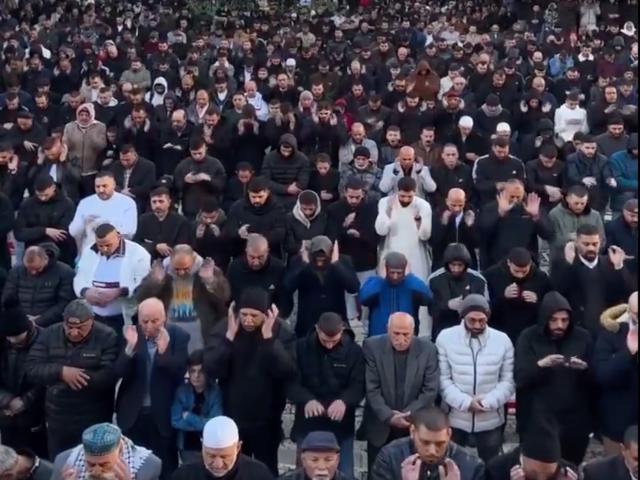In a remarkable demonstration of Israel's commitment to religious freedom and tolerance, even amidst ongoing hostilities with Palestinian militants in Gaza and Judea & Samaria, an impressive turnout of over 60,000 Palestinians was recorded entering Israel to participate in Eid Al-Fitr prayers at the Al-Aqsa Mosque, situated in the historic heart of Jerusalem's Old City. This site, ensconced in the southwestern precinct of the revered Temple Mount—home to the ancient edifices of Solomon and Herod's Temples—stands as a testament to the shared sacred heritage and complex history of the region.
Ensuring the safety and security of this significant event, extensive deployments of Israeli police were stationed at strategic points including the entrances, surrounding areas, and narrow passageways of Jerusalem's Old City, a destination celebrated worldwide for its historical and spiritual significance.
Eid prayer at Masjid Al Aqsa 🌟🤲🏽#Eid pic.twitter.com/MTYRX4ND0J
— Muslim (@Muslim) April 10, 2024
The Islamic Endowments Department in Jerusalem publicly acknowledged the peaceful assembly of more than 60,000 devotees who gathered at the Al-Aqsa Mosque to mark Eid Al-Fitr, the celebratory conclusion to the holy fasting month of Ramadan. The arrival of worshippers began before the break of dawn, a testament to their devotion and eagerness to partake in the morning prayers at this sacred site.
Although minor altercations occurred between Israeli police and a few individuals attempting to access the mosque, the morning unfolded with minimal disruptions. Contrary to claims circulated on Palestinian Telegram channels of indiscriminate actions by Israeli forces, the situation remained largely calm.
Tens of thousands of worshipers arrived at the Temple Mount this morning for the Eid al-Fitr prayer at Al Aqsa mosque -Israel allows freedom of worship for all religions despite the challenges and attempts of terrorist organizations to incite
— Lorena Khateeb | لورينا خطيب (@kh_lorena) April 10, 2024
Is this what an apartheid looks like? pic.twitter.com/NCvpYeMEP8
In a few instances, Israeli police restricted entry to the Temple Mount complex—home to the Al-Aqsa Mosque and the world's third-holiest site for Muslims—citing concerns over potential disturbances. This decision was influenced by heightened tensions across Judea and Samaria, attributed to the Israeli army's actions against Hamas in the Gaza Strip following a heinous cross-border attack on October 7th. During such periods of increased unrest, Israel has taken measures to limit access to the Temple Mount for young Palestinian Muslims to prevent escalations.
It's noteworthy that the Al-Aqsa Mosque, while being the holiest site in Judaism, is subject to access restrictions for Jews, especially during the Eid holidays when it is exclusively open to Muslims. This contrasts with Israel's policy during Jewish festivals, where access to holy sites is not restricted for any group. However, due to past instances of rioting and disturbances during Islamic holidays, precautions are taken to ensure the safety and sanctity of these occasions.
Eid Al Fitr prayers in Masjid Al Aqsa!#EiAlFitr pic.twitter.com/ARrtWg90u1
— The Holy Mosques (@theholymosques) April 10, 2024
Israel's sovereignty over Jerusalem, including the Old City, was solidified following Jordan's withdrawal during the 1967 Arab-Israeli War, with Israel officially annexing the city in 1980 and declaring it the nation's undivided capital. Despite these historical realities, Palestinian narratives often challenge Israel's jurisdiction over Jerusalem, portraying it as an eternal Islamic city, thereby overlooking three millennia of Jewish history initiated by King David's establishment of Jerusalem. This perspective neglects the multifaceted history and the deep, enduring connections various faiths have with this city, underscoring the complex tapestry of identities and beliefs that Jerusalem represents.


